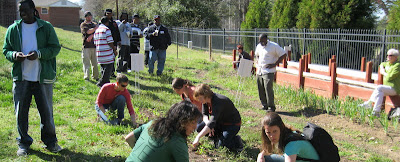For her Environmental Education Certification Community Partnership Project, Cindy created comprehensive and easy-to-use garden maintenance training materials for local community gardeners. Her project required extensive research which included visits to several community gardens in the area to assess their training needs. She also partnered with the Inter-Faith Food Shuttle, which will be the first community garden to implement her training materials. Cindy plans to volunteer and assist other community gardens in the area with her resources.
The Environmental Education Community Partnership Project is one of five required criteria areas in the N.C. Environmental Education Certification Program, which is managed by the N.C. Office of Environmental Education and Public Affairs. The purpose of the project is to provide EE Certification candidates with the opportunity to lead a partnership that has a positive effect on the community and increases environmental awareness and understanding.
Photo from Inter-Faith Food Shuttle, Raleigh: http://www.foodshuttle.org/





